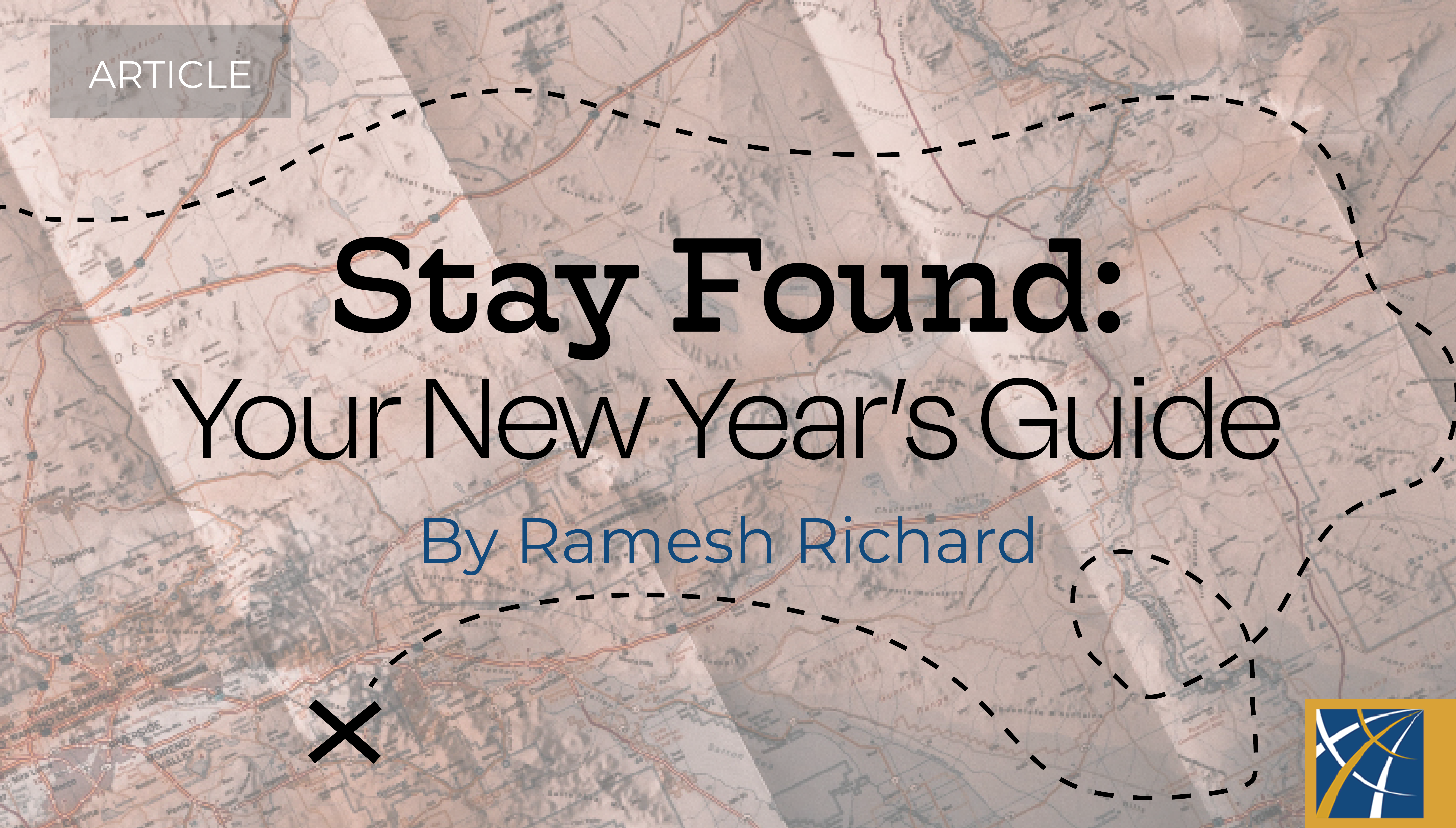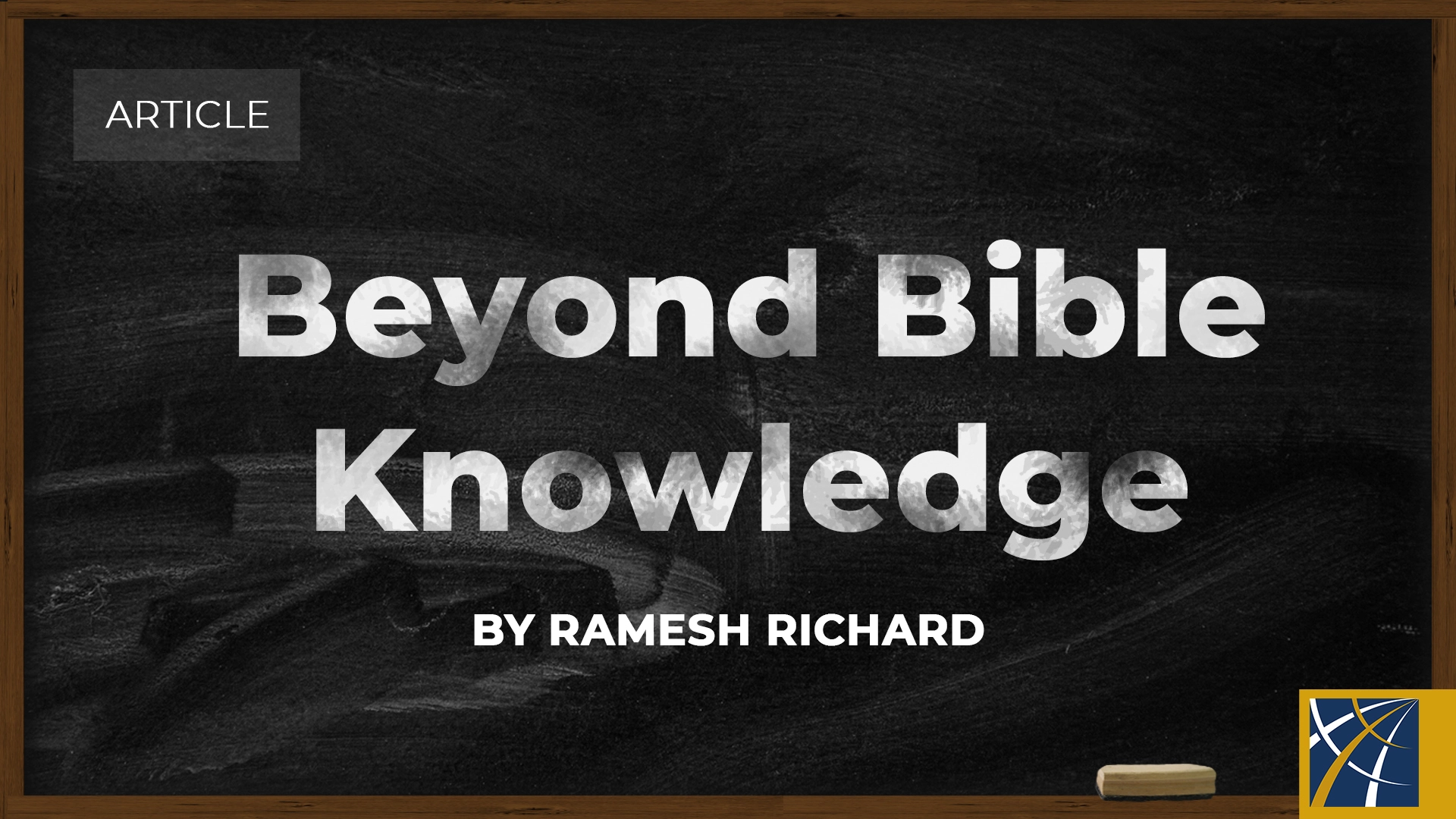by Ramesh Richard
In her book Staying Found: The Complete Map and Compass Handbook, June Fleming suggests various ways hikers can master the skills of “wilderness route finding”—learning how to get around in the wild. By this she means, “Not just carrying a map and compass because they’re on every book’s list of essential items, but being absolutely sure of how to use them to fullest advantage…. Many hikers don’t know how to stay found and, once lost, unwittingly compound their problems and work against being rescued.”¹
What better metaphor than “wilderness route finding” fits us when we go astray in a world that has lost its way?
Fortunately, it is possible to get found when you get lost. The Lord Jesus “came to seek and save those who are lost” (Luke 19:10).
But how do you stay found even when you stray away?
To stay found, you must use a map and compass to full advantage. How? By not working against the Guide who has found you and has a purpose for you through the wilderness.
GOD’S PURPOSE
That the Creator has designed you on purpose shouldn’t surprise you. A divine Creator without a supreme purpose cannot be worshiped, let alone loved, obeyed and recommended.
A God of purpose reverberates all through Scripture; He created human beings purposefully to accomplish His purpose(s). God doesn’t live by the seat of His pants in all sorts of powerful but arbitrary, clever but erratic, ways. As the ultimate, omnipotent, strategic Planner, the omniscient Master Designer, the Chairman of the Board of the Universe, He cannot be characterized as a God of accidents. Though all history is made up of incidents, they are not incidental to His purpose. Everyone, everything, everywhere lodges in His purpose for a purpose. He is the only One who doesn’t die the death of a well-planned life. The Bible is explicit and articulate on the God of purpose and the purpose of God.
God has a purpose for creation and has made every thing for a purpose.
God “works out everything in conformity with the purpose of His will” (Eph. 1:11). “The LORD has made everything for its own purpose, even the wicked for the day of evil” (Prov. 16:4 NASB). His plan includes all of creation, salvation, time (past, present and future), and reality at the minutest and largest levels.
God’s purpose is settled, fixed and unchangeable.
“He is mighty, and firm in His purpose,” says Elihu (Job 36:5), an assertion that the plagued but defensive Job doesn’t question, but confirms: “I know that You
[God] can do all things; no plan of Yours can be thwarted” (42:1). Like His self-declared, unchangeable nature (Mal. 3:6), God’s purposes are unchangeable (Heb. 6:17). Time, people and circumstance can never unsettle His purposes. “The plans of the Lord stand firm forever, the purposes of His heart through all generations” (Ps. 33:11). His purpose always prevails (Prov. 19:21). Jesus was handed over to be crucified by God’s set purpose (Acts 2:23). Those who plotted, carried out their plan, and pounded the nails only did what God’s power allowed and what His will had decided beforehand would happen (Acts 4:28).
God never has to retract His purpose.
God never has to confess His ignorance, apologize for His thoughtlessness, admit His carelessness, or acknowledge His intellectual weakness. These shortcomings, when attributed to God, reflect human limitations—including the tendency to think of Him in human terms. God is not unpredictable in His revealed purposes, though He is unfathomable. There are no holes in His administration, no gaps in His governing, no delays in His execution. While we humans must wisely change our decisions in real time as new information becomes available, God’s omniscience guarantees unchangeability of purpose. He alone can proclaim, “I have decided and will not turn back” (Jer. 4:28).
God moves human beings, even His enemies, to freely accomplish His purpose.
Unbelievers are not privy to God’s purpose or guidance unless He decides to reveal it to them, but they are moved by it (cf. Nebuchadnezzar in Dan. 2ff; Cyrus in Isa. 45ff). “Woe to those…who say, ‘Let God hurry, let Him hasten His work so we may see it. Let it approach, let the plan of the Holy One of Israel come, so we may know it’” (Isa. 5:19). Pharaoh, the single superpower leader of his time, was informed of God’s particular purpose for him, displaying God’s power and thereby declaring His name through the whole earth (Exod. 9:16; cf. Rom. 9:17).
God will bring all His purposes to pass.
God is pleased with His purposes: “I make known the end from the beginning, from ancient times, what is still to come. I say: My purpose will stand, and I will do all that I please” (Isa. 46:10). His children don’t have to be afraid, for His purposes are based on His faithfulness: “O LORD, You are my God; I will exalt You and praise Your name, for in perfect faithfulness you have done marvelous things, things planned long ago” (Isa. 25:1). God’s very word will accomplish His purposes: “So is My word that goes out from My mouth: It will not return to Me empty, but will accomplish what I desire and achieve the purpose for which I sent it” (Isa. 55:11).
Sadly, it is possible to personally reject God’s intentions for you without sabotaging His unchangeable purpose for you or the universe. Of course, this disobedience is understood in the “soft” sense that “you may decline His wishes for you.” Jesus says, “The Pharisees and the experts in the law rejected God’s purpose for themselves, because they had not been baptized by John” (Luke 7:30). God “is patient with you, not wanting anyone to perish, but everyone to come to repentance” (2 Pet. 3:9), but those who do not believe on His only begotten Son will perish (John 3:16-18). Though His wishes for you may be refused, His will for you is immutable.
The Church, a new, post-Cross creation on earth, is as old as God’s purpose, “but not made known to men in other generations” as now (Eph. 3:1-6). “By abolishing in His flesh the law with its commandments and regulations, His purpose was to create in Himself one new man out of the two, thus making peace” (Eph. 2:15), a mystery not known in earlier generations. If you are a believer in the Lord Jesus Christ, you are part of His Pentecost establishment—the Church, His eternal purpose newly revealed to the world in this time of His kingdom rule.
As we enter into another year of uncertainty and unpredictability, it is possible that the wilderness feels overwhelming because of our lacks and losses in route finding skills. It’s at this bewildering point that we take full advantage of God’s purposes for all reality by following our Sovereign Strategist. Here’s what He declared at another point of moral deceleration and social decline:
Remember this, fix it in mind, take it to heart, you rebels.
Remember the former things, those of long ago;
I am God, and there is no other; I am God, and there is none like Me.
I make known the end from the beginning, from ancient times, what is still to come.
I say: My purpose will stand, and I will do all that I please.
From the east I summon a bird of prey; from a far-off land, a man to fulfill My purpose.
What I have said, that will I bring about; what I have planned, that will I do. (Isa. 46:8-11).
You can master the skills of route finding in life’s wilderness by taking full advantage of the Sovereign God’s purpose for you—found in the map and the compass—and by following the Guide who accompanies you into the unknown future. You can always stay found.
If you’d like to explore this critical topic more deeply, try Ramesh Richard’s book Soul Vision, the third volume in his Intentional Life Trilogy, available here.






